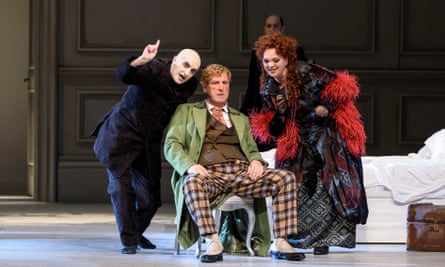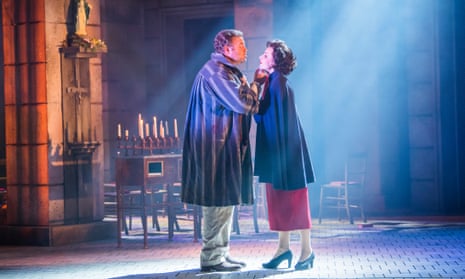Opera offers everything, they say. Never before has it featured such an exquisite incongruity as Jonathan Dimbleby, in black tie, hurrying on stage at 10.01pm with a scrap of paper bearing the exit poll results broadcast to the nation a minute earlier by his brother, David. The mix of gasps and noisy cheers at Grange Park Opera’s beautiful Theatre in the Woods proved one thing: opera audiences, even on the glittering inaugural night of a new country house venue packed with rich donors, fiercely embrace the entire political spectrum.
To complain that this piece of news upstaged the final act of Puccini’s Tosca – in which the heroine leaps off the parapet after her lover, Cavaradossi, is murdered – would be unfair to the performers, excellent BBC Concert Orchestra, chorus, conductor Gianluca Marcianò and every one of the hundreds of people who enabled the show to go on. That it did – in a nearly finished theatre built in 11 months, exactly a year after the company was forced to leave its original Hampshire home – is little short of miraculous. It cost £10m, and only £2m has yet to be raised. The joint focus and determination of chief executive Wasfi Kani and supreme builder Martin Smith made it happen.
The 750-seat theatre, a drum-like construction with a four-tiered horseshoe auditorium and immediate, lively acoustic, crouches in the walled grounds of West Horsley Place, Surrey, former home of the Duchess of Roxburghe. It’s as if a seed has blown in from La Scala, Milan, the building’s inspiration, and sprung up in the tumbledown grandeur of an ancient bit of English green belt some 20 miles from London. The new owners, the ultra-relaxed Bamber (the Duchess’s great nephew) and Christina Gascoigne, seem unfazed by any aspect of the zany tale in which they find themselves starring.
There will be time enough to examine in more detail productions by the reconfigured GPO. For now, it’s enough to report that this was a clearly told, traditional production of Puccini’s masterpiece, directed by Peter Relton and designed by Francis O’Connor, with stirring performances from the Russian-Italian soprano Ekaterina Metlova, the Maltese superstar tenor Joseph Calleja and the British baritone Roland Wood. Time to move on from receding fallouts between Grange Park Opera and its previous landlords (the Barings) at Northington Grange. A new festival has started there. People in the row behind me noted they were looking forward to going to both. They won’t be alone. Let’s see how this story unfolds.

There’s no easy way to update Richard Strauss’s Der Rosenkavalier. It’s locked in the double sensibilities of its premiere (1911) and its 18th-century Viennese setting, quite complicated enough without introducing trucker caps. So the expectation that a production will have Louis XV furniture, wood panelling and liveried servants tends to be fulfilled. The test for director and designer is to find novelty without tiresome exertion. Olivia Fuchs and Niki Turner (with lighting by Ian Jones) have achieved that, some reservations aside, in a compelling new staging for Welsh National Opera.
Above all, musical standards gleam across cast and orchestra, from principal singers on stage down to jingle bells in the pit. This is a long work, laborious if any aspect is weak: the scenes involving the revolting Baron Ochs can be cringe-inducing. WNO’s casting is spot on. Each singer can act well too, pointing up the brilliance of Hofmannsthal’s text and making each character credible, even in this far-fetched plot. All praise, first, goes to WNO’s new music director, the Czech-born Tomáš Hanus, appointed last year. If everything he does is as good, the company has cause to smile. Here he kept a deft balance between exuberance – horns whooping in noisy vulgarity, harps and celesta sweetly viscid – and essential rigour. Strauss’s voluptuous score needs muscle, too: singers were never drowned out. The prelude brought out that strange instability in the strings, characteristic of Strauss, in which you are not sure where the beat is. The WNO orchestra was at the top of its game, with some super-precise string playing, especially at the treacherous high ending to act one.
Rebecca Evans, a WNO favourite, sang her first Marschallin, anguished by the ticking clock, aware of her accelerating farewell to youth, wistful and convincing. Fuchs’s decision to have a silent, older woman – touchingly played by Margaret Baiton – as a quasi ghost of Christmas future nearly worked, and had a witty payoff in the opera’s closing moments. Nearly but not quite… less would have been more. The moment her appearances became predictable, which they did, the point was lost.
As Octavian, Lucia Cervoni struck just the right mix of boyishness and femininity, and managed to avoid being irritating when doubly cross-dressed as Mariandel the maid. For Louise Alder, named last month as best young singer in the 2017 International Opera awards, the role of Sophie was a gift. In addition to spirited, pristine singing, Alder made the part far more febrile and clever than usual, moving with enough restless energy to use up a week’s calories in an hour.
And so to Baron Ochs, among Strauss’s most grotesque roles (and he wrote a few). The bass Brindley Sherratt, one of those versatile musicians whose reliability you almost take for granted, was priceless in his Ochs debut. Unrecognisable in spats, checks and a carrot-coloured rug, he mastered this enormous role with glee and vocal gusto, at once fruitily repellent and pathetically charming. If only all singers could act so imaginatively. See him, and the rest of the cast, including those guttersnipe gossips Annina and Valzacchi (Madeleine Shaw and Peter Van Hulle) in the remaining two performances: Cardiff on Saturday, Birmingham on 1 July.

Silent Opera requires no orchestra, no dressing up. The company’s latest production, Vixen, in the vaults below Waterloo station, is a recreation (by Daisy Evans, Stephen Higgins and Max Pappenheim) of Janáček’s Cunning Little Vixen. This fox is urban: a runaway teenager, homeless on the streets of London. Swaths of Janáček’s orchestral score alternated – through headphones worn by the audience, as in silent discos – with new musical material, inevitably thin in comparison, recorded or live. Five lively, walk-about instrumentalists also sang and acted. No talent was wasted.
The pure-voiced soprano Rosie Lomas, who has sung small parts at ENO, threw herself into the title role with birdlike vitality and brave physicality. Baritone Ivan Ludlow added vocal weight and experience as Forester. Directed by Evans, this immersive promenade unsettled and absorbed. We climbed deeper into vaulted spaces, sat on old mattresses, ducked as violent gesture narrowly missed us. At the end, we filed out to the sounds of Lorde’s anthemic hit Royals: “No postcode envy … We’re driving Cadillacs in our dreams.”
Overhead the trains rumbled. Outside the city bristled.
Star ratings (out of five)
Tosca ★★★★
Der Rosenkavalier ★★★★
Vixen ★★★★

Comments (…)
Sign in or create your Guardian account to join the discussion